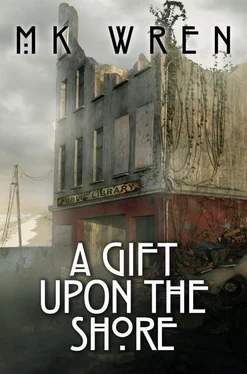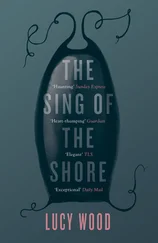Miriam in candlelight, golden light lambent in her hair, and I thought then that her color and the chiaroscuro light might inspire a Rembrandt, someone who would understand the shadows in her incandescence.
She recognized in my modest request a larger plan, and what I read in her eyes was elemental and frightening: a righteous rage.
Miriam, did you think it would be over when the old woman died ?
No doubt she hoped so.
And so this morning she tried to put the fear of god into Stephen, to bring him—and perhaps the rest of the family—to heel.
I continue down the slope, grateful when it gentles into the pasture, giving me nearly level ground to walk on. I pass the pond near the fence and remember its genesis. There was always a seeping spring here, a slough of dampness where skunk cabbage flourished. Jerry made a pond of it to provide water for the livestock by blasting out the earth. With dynamite. He brought it with him from the Ark, and I remember clearly that crashing fountain of dirt and sod. Jerry was inordinately proud of it. But the dynamite—and there are still fifteen sticks of it in the storeroom—made me uneasy. I knew all too well how such plowshares were beaten into swords.
I turn my back on the pond, walk through the tangy new grass to the gate, remembering how little Jerry knows of swords.
When I reach the house, I find Enid and Grace sitting on the deck off the living room in the north wing. Grace rises when I approach. “Sit down, Grace,” I tell her. “You needn’t leave just because I’ve arrived.”
Grace is ten years younger than I, yet to me she seems older. Of course, we all seem older. I’m older than my grandmother was at sixty-five; the medical and cosmetic miracles she took for granted died with the golden age. Grace hides her thin, gray hair under a white scarf tied at the back of her neck. There was a time when that scarf aligned her with community tradition. Now I suspect there’s a sad vanity in it. I once heard her say that in her youth her hair was like spun gold. But the gold is gone, and Grace is a lost soul who can never find her way home again because her true home is gone.
And in her heart, I know, she blames me for that.
Grace stays, although she remains standing, and we three old women chat about the weather and other safe subjects, then she says she must go help in the garden. The weeds are growing like—well, like weeds, and she laughs unconvincingly as she makes her retreat.
I sit down in the cedar-slat chair next to Enid’s, and after a long silence she looses one of her expressive sighs. “I suppose Jeremiah’s right,” she says. “We should all just forget about it.”
Enid tends to misplace antecedents, but I know exactly what she’s talking about. Enid is tall and ungainly, her brown hair shot with gray, her face too angular to be called anything but plain, yet her smile is magnificent, a revelation of gentle solicitude. But she’s not smiling today. The lines around her eyes and mouth seem deeper.
“Enid, we can’t just forget about a boy being whipped.”
She shakes her head, callused hands rubbing against each other dryly. “No, and I never wanted to see Stephen hurt, and yet…”
“And yet you think he deserved it?”
“Well, he did blaspheme. I guess he did. But it seems to me the Lord would forgive a boy. I mean, I’m sure he didn’t really know She can’t seem to bring that thought to a conclusion. I don’t pursue it. “By the way, where is Stephen?”
“Well, I suppose he’s out in the garden. Such a lovely day, and high time we got the ground ready for the seedlings.” She rises, as if goaded by that reminder of her own duties.
“And high time Stephen was here.” I try to keep the annoyance out of my voice, but her look of dismay tells me I’ve failed.
“Oh, I’d forgotten. Stephen begins his special lessons today. I guess Miriam just…” Enid hesitates, then hurries toward the steps at the south end of the deck. “I’ll go find him and tell him you’re waiting.”
“Thanks, Enid.” I push myself to my feet. “I have to get something from my room. Tell him I’ll meet him here.”
When I return to the deck, Stephen still hasn’t appeared. I sit in one of the chairs while Shadow circles and settles at my feet. Two of the cats, Juliet and Emily, are sunning themselves on the deck railing. In the pocket of my skirt is a small magnifying glass, and I hold in my lap a black-bound, five-by-seven-inch sketchbook. It’s only one of eight that have been hidden for many years in the bottom drawer of the chest in my room. My souvenir drawer, I call it, where I’ve consigned memories I no longer wish to be reminded of.
Rachel gave me the sketchbooks, and I filled them not with drawings, as she would have, but with words, with a sporadic, disorganized, occasionally agonized history of the last forty years of my life. They might as well have been written in blood.
I’m not looking forward to unleashing the memories locked within these diaries, yet I need now to make sense of them, to find the meaning, the legacy in them. To write them. I was a writer Before. I just saw the proof of that in my souvenir drawer, a paperback novel titled October Flowers . A trivial thing, so it seems now, about fathers and daughters and the men daughters love. It was dedicated to my father. Posthumously. He died when I was eleven, only three months after he and Mother and I came to Shiloh Beach for that long summer week at Aunt Jan’s house, the house by the sea that was her legacy to me when she died thirteen years later in a nursing home in Portland.
I open the diary, reach automatically for the magnifying glass, but I don’t need it. The writing is large and legible. Still, I don’t at first recognize it. Yes, it’s my handwriting, but the years have separated me from these loops and lines. The Mary Hope, twenty-four years old, who wrote these words was not the same Mary Hope who reads them now.
The squeak of the sliding glass door that opens into the living room rouses me. I look around and see Stephen. He wears a shirt of fine, pale wool, pants of dark leather thrust under the tops of laced moccasin boots, and a headband of goldenrod yellow. His Christian mantra, embroidered on the headband in brown thread, is ENTER YE IN AT THE STRAIT GATE. It’s all standard attire for the male members of the family, but the earthy colors suit him well. No, he’s not a child, and it seems to have happened suddenly, his growing up. And like his mother, he has a face that seems as if it has been cast in burnished bronze. But in his eyes—large, slanted into heavy lids, black and deep as night—is life and intelligence and curiosity. He reminds me at this moment of a young man I once loved when I lived in Portland, a man named Dean, who called me Green Eyes and sent me oblique smiles—leopard grins, I called them—full of wry laughter and knowing sadness.
But now Stephen’s hooded eyes are reflective, revealing nothing. I motion him to the chair beside me. He sits down, but doesn’t lean back. I wait out his reticence, and finally he asks, “Did I do wrong, Mary?”
“What? You mean in questioning the lineage of Jesus? Well, did you intend to hurt anyone when you asked your questions?”
He frowns at that. “No, of course not.”
“Then I can’t see that you did wrong.”
He shifts his shoulders slightly, grimacing. “You always said we should ask questions.”
“And I still say it.”
“But Miriam said it was wrong. And Jeremiah agreed with her.”
“And I say it was not wrong,” I answer bluntly. “Stephen, things aren’t as simple as you were led to believe when you were a child. You’re on the edge of adulthood now, and there are some hard truths you’ll have to recognize. One is that good and bad are not absolutes. They’re entirely subjective. They’re judgments. Opinions.”
Читать дальше












